| Srl | Item |
| 1 |
ID:
181872
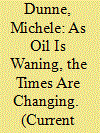

|
|
|
|
|
| Summary/Abstract |
With the future of fossil fuels looking bleak, resource-dependent regional powers are competing for other means of securing their positions. While some are striking new alliances—even with Israel— they are also redoubling efforts to stamp out democratic voices at home and abroad.
|
|
|
|
|
|
|
|
|
|
|
|
|
|
|
|
| 2 |
ID:
181871
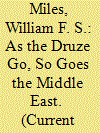

|
|
|
|
|
| Summary/Abstract |
The Druze, despite being a small minority faith group, have long survived in a challenging region, thanks in part to a doctrine of deference to whatever state they live in. In the past few years, however, the three largest Druze populations—in Israel, Lebanon, and Syria—have each faced some of their most difficult challenges yet, from a downgrading of their citizenship status to economic collapse and civil war. An increasingly active diaspora has emerged as an important advocate for Druze interests worldwide.
|
|
|
|
|
|
|
|
|
|
|
|
|
|
|
|
| 3 |
ID:
181868
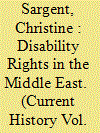

|
|
|
|
|
| Summary/Abstract |
Across the Middle East, two key dynamics characterize disability rights movements: dynamism and fragility. The United Nations Convention on the Rights of Persons with Disabilities accelerated regional recognition of disability as central to human development and social justice initiatives. New communication platforms, legislative interventions, and institutional capacity-building reflect currents of change and innovation—frequently driven by ground-up initiatives led by or in collaboration with disabled persons’ organizations. At the same time, the COVID-19 pandemic and protracted humanitarian crises pose threats to health and well-being across the region, with grave implications for disabled persons and their movements.
|
|
|
|
|
|
|
|
|
|
|
|
|
|
|
|
| 4 |
ID:
181870
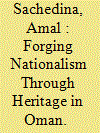

|
|
|
|
|
| Summary/Abstract |
During his five-decade reign, Sultan Qaboos bin Said relied on heritage as a key tool for nation-building. Old forts and objects central to Omani traditional culture like the coffee urn and the ceremonial dagger became symbols of a unifying national ethos. At the same time, their former political significance was downplayed. But some Omanis have held onto memories of a different conception of the past. And now, after the sultan’s death in 2020, heritage is becoming more of a privatized business sector.
|
|
|
|
|
|
|
|
|
|
|
|
|
|
|
|
| 5 |
ID:
181867
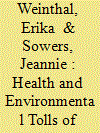

|
|
|
|
|
| Summary/Abstract |
The effects of conflict on public health and ecosystem well-being are understudied and rarely figure in public debates about war-making. Protracted conflicts are particularly damaging to people and environments in ways that are inadequately documented. In recent wars in the Middle East and North Africa, parties to the conflicts have induced hunger and displacement and undermined public health through the use of violence and economic policies that deprive civilians of access to food, water, fuel, and livelihoods. Environmental pollution is widespread, particularly in cities that became war zones, while the COVID-19 pandemic has deepened conflict-induced poverty and food insecurity.
|
|
|
|
|
|
|
|
|
|
|
|
|
|
|
|
| 6 |
ID:
181869


|
|
|
|
|
| Summary/Abstract |
This essay analyzes the ways in which official memory discourses in Kuwait promote willful forgetting of certain aspects of the country’s past through acts of repressive erasure. By looking at how it has shaped narratives about the pre-oil era, the post-1950 advent of oil-fueled modernization, and the period since the 1990 Iraqi invasion and occupation, we can assess both the functions and the consequences of the Kuwaiti state’s tendencies toward erasing aspects of the past. The essay also provides examples of how Kuwaiti artists and writers have challenged these official histories.
|
|
|
|
|
|
|
|
|
|
|
|
|
|
|
|